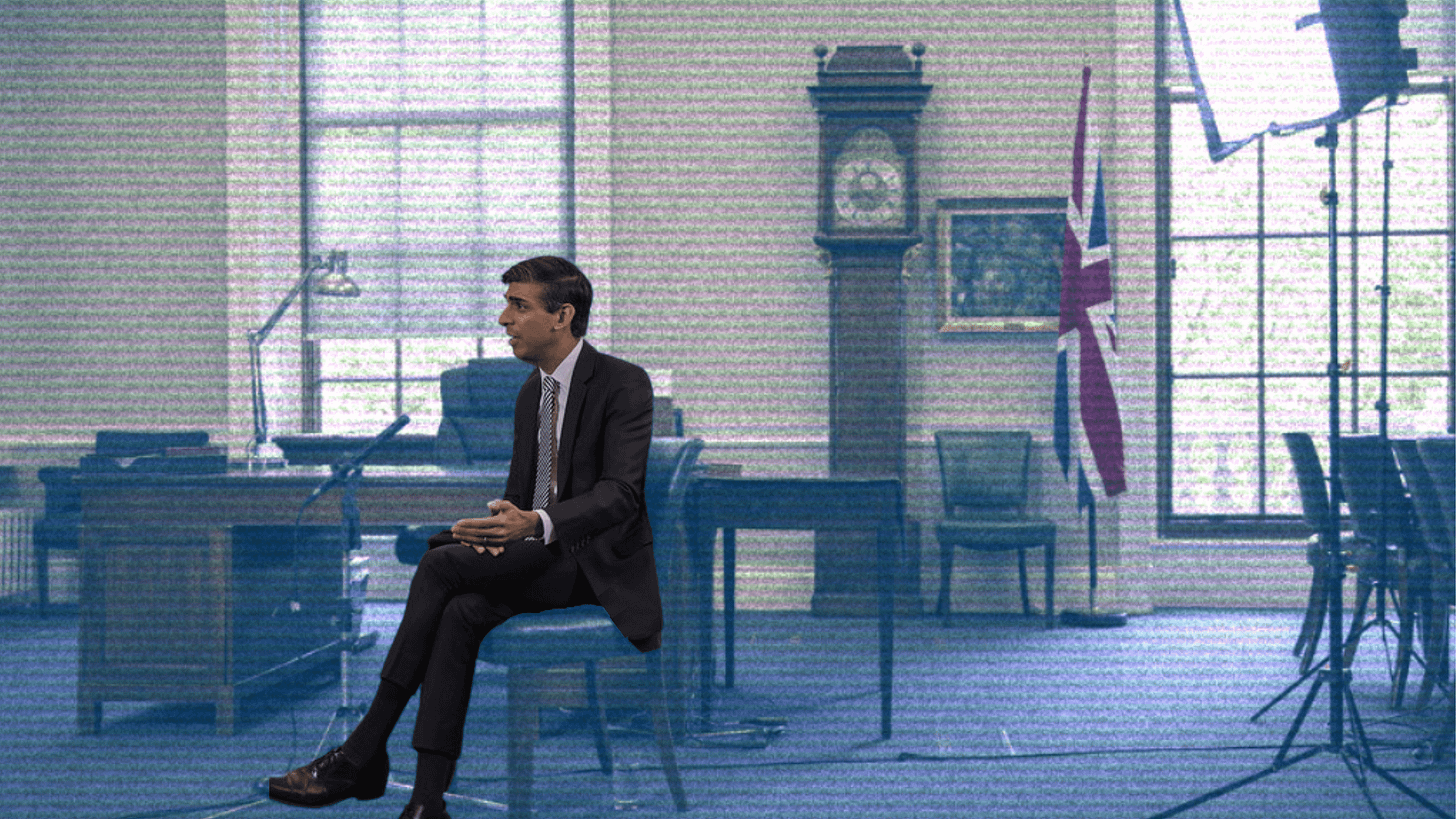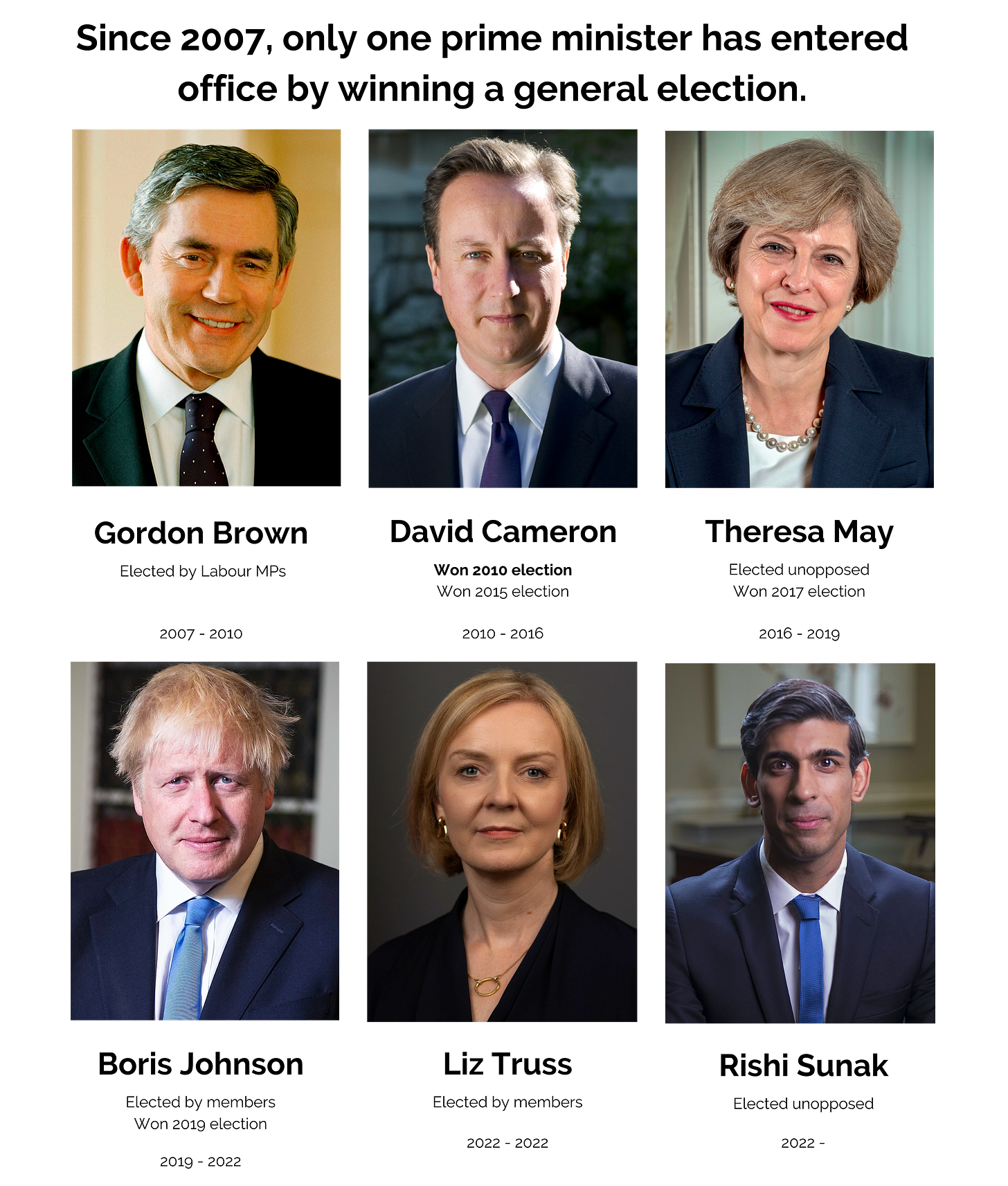Rishi Sunak's first challenge? The pro-election coalition
The incoming prime minister must stare down calls for an election if he is to ever succeed
In August 2005, now-defunct stationary store Staples released a novelty oversized red button.
It served no purpose beyond ringing out a gimmicky catchphrase every time some poor office-bound soul pressed it. Within months, ‘that was easy’ became a slogan recognised around the world.
If there was ever a perfect housewarming gift for new prime minister Rishi Sunak, it would be that button. Sunak’s ascent to the top job was, at the second time of asking, fairly straightforward - fighting off the lingering threat of a Boris Johnson Rocky-style return with relative ease. 7,000 people had tracked the 57-year-old’s fight from the Caribbean to the UK, and within 72 hours he claimed he had found 102 backers. You wouldn’t know them, though… they go to a different parliament.
Johnson infamously ended his time at the dispatch box channelling his inner Arnold Schwarzenegger, barking ‘Hasta la vista, baby’ like a drunk uncle on a stag do. One glance at the polls and Rishi’s own pitch to MPs could have been lifted from Terminator 2: 'Come with me if you want to live.'
Even if Sunak succeeds at calming the markets and plugging the estimated £35bn economic black hole, his lack of genuine democratic mandate will become a jarring issue for voters sick of seeing new PMs parachuted into No.10 without getting a say.
63% of Brits - including 71% under the age of 24 - say Sunak’s first act should be to call an election, which would be the fifth since 2010.
But with Keir Starmer’s Labour Party 35 points ahead in the polls by virtue of simply existing, any Tory prime minister forcing their MPs onto the campaign trail would likely end up culpable for 300 cases of political murder. On current modelling, a snap election would leave the Tories with an embarrassing 48 seats to Labour’s 507 - creating the single largest parliamentary majority in history.
One glance at the polls and Rishi’s own pitch could have been lifted from Terminator 2: 'Come with me if you want to live.'
Under a week after Liz Truss was deposed by the mythical powers of the so-called ‘anti-growth coalition’, Sunak has a much fiercer battle ahead: the pro-election coalition.
It is broad and unpredictable in nature - enticing pro-Boris Conservatives in addition to opposition parties sensing blue seat blood in the water.
SNP Westminster leader Ian Blackford said his party, which would, on current polling, render extinct the Scottish Conservatives, were already gearing up for an election campaign. Starmer has even called for an unholy alliance between Boris-backers and his own pro-election campaign, in the belief some would sacrifice their side’s majority to decimate Sunak.
And some alliance that would be: former Culture Secretary Dorries tweeted ‘It will now be impossible to avoid a general election’, whilst Lord Goldsmith, who once gave Johnson the use of his luxury Spanish villa, added that an election was now ‘morally unavoidable’.
Even Johnson himself implied that a mandate was a pre-requisite of governing. In his lengthy statement withdrawing from the contest (that he’d never officially entered), Johnson claimed he alone was “uniquely placed to avert a general election now” - implying Sunak would find such calls hard to resist without a previous election win.
The continuing scale of blue-on-blue melodrama flies in the face of the ‘stability and unity’ with which the new leader now seeks to govern. Talk of his own side calling for an election should be especially harrowing given his Party’s penchant for regicide, with all four of the last Conservative leaders driven to resignation by internal politics as much as national politics.
Amongst some Tory MPs and many thousands of party members, Sunak is still viewed as the snake who sank the Johnson boat, his resignation (within 30 minutes of Sajid Javid’s own farewell) driving a final, fatal blow into the heart of a scandal-ridden administration. Coupled with the gut feeling of Westminster insiders that Boris, not Rishi, would have won a members’ vote, and once again selected agents of chaos are now ready to turn the guns on their own party.
And the rebels could not wish for a better backdrop to plot with. Two-and-a-half-year old manifestos have been overtaken by the world around them. When Brits last filtered through polling stations in December 2019, Covid-19 was but a confusing virus in an unknown Chinese city.
The 2019 ‘Get Brexit Done’ package was also reneged on several times by both Johnson and (in double-quick time) Truss. Last week’s chaotic vote on allowing fracking, in which Truss became so distracted by literal Tory in-fighting that she forgot to vote - was a blatant U-turn on a manifesto commitment to ban the practice outright.
The world has changed dramatically, and the candidates have too.
Ultimately, nothing Sunak achieves will matter unless he is able to calm calls for a general election. Whatever Rishi’s slick PR team will say, ‘nobody voted for you’ is a genuine argument that everybody can understand - north to south, 18 or 80-years-old.
The ex-city boy may yet calm the markets, bring down inflation, save mortgage rates and even keep up British support to Ukraine, but it will never quell demands for an election. Whilst even his biggest detractors have praised to his talent and stratospheric rise to the upper echelons of British politics, it is impossible to understand how Rishi Sunak can effectively and legitimately govern until 2024 without the British public ever having their say.
If his campaign was red-button easy, the challenge posed by the pro-election coalition will be anything but.
Thomas Godfrey is the Editor of Hybrid Magazine





